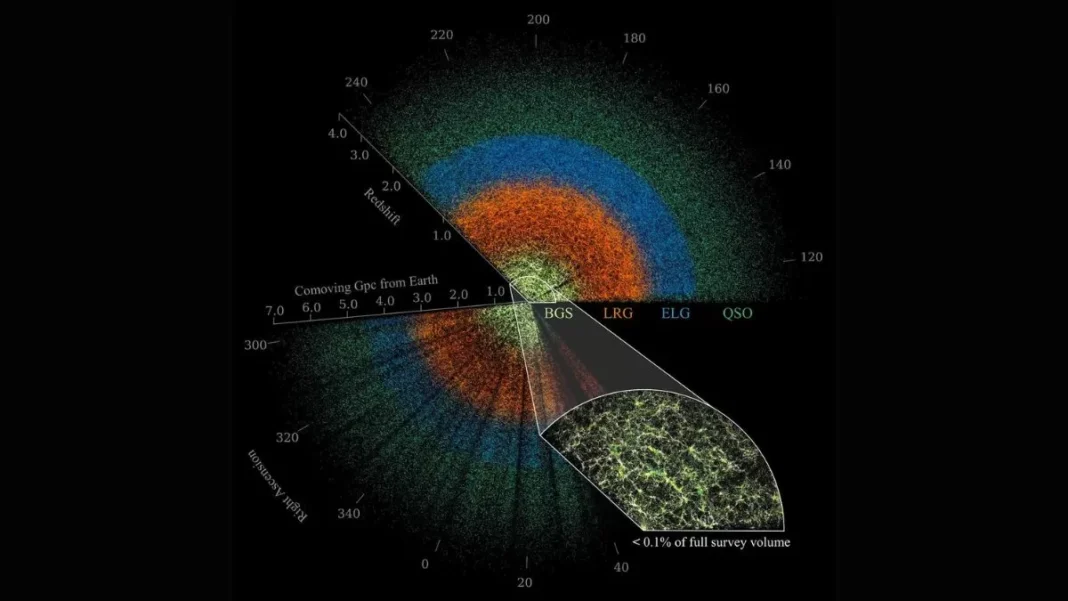New research from the Dark Energy Spectroscopic Instrument (DESI) project has surprised the scientific community with its groundbreaking findings. For decades, dark energy has been considered a constant force that has a stable influence on the expansion of the universe. However, the latest data from the DESI project suggests that this may not be the case.
The DESI project, a collaboration of over 500 scientists from 13 countries, has been mapping the sky with the goal of understanding the mysterious dark energy that makes up about 70% of our universe. They have recently released their first set of results, which have challenged long-held cosmological models and opened up new possibilities for our understanding of the universe’s evolution.
Dark energy was first proposed in the late 1990s as a possible explanation for the accelerating expansion of the universe. This mysterious force is believed to be pushing galaxies apart, counteracting the force of gravity. However, little is known about its nature, and scientists have been working tirelessly to unravel its secrets.
Until now, it was assumed that dark energy is a constant force that has remained unchanged throughout cosmic history. However, the DESI data has revealed something remarkable – dark energy may be changing over time. This has left scientists baffled and excited to explore this new perspective.
The DESI team used the powerful 4-meter Mayall telescope at Kitt Peak National Observatory in Arizona to obtain the most detailed map of the universe to date. They observed over 15 million galaxies, using a technique called spectroscopy to measure the redshift of the galaxies. This is a measure of how much the light from a galaxy has been stretched due to the expansion of the universe. The higher the redshift, the farther away the galaxy is and the more it has been affected by dark energy.
The results showed that the farther away the galaxies were, the faster they were moving away from us. This is in line with previous observations and confirms the presence of dark energy. However, what surprised the scientists was that the amount of acceleration seemed to vary depending on the time period in which the galaxies formed. This implies that dark energy may not be a constant force but rather change over time.
This discovery has raised new questions about cosmic evolution. If dark energy is indeed changing, then it could have played a bigger role in the early universe and a smaller role in recent times. This challenges our current understanding of the universe’s expansion and could lead to new theories and explanations.
The DESI team is now planning to continue their observations and gather more data to confirm these initial findings. They are also collaborating with other projects, such as the European Space Agency’s Euclid mission, to further understand dark energy and its effects on the universe.
The implications of this research go beyond just understanding dark energy. It could also have an impact on other areas of cosmology, such as the study of dark matter and the origin of the universe. It also shows the power of technology and collaboration in advancing our knowledge of the universe.
The DESI project is a remarkable example of international cooperation and determination to unravel the mysteries of the universe. It brings together scientists from diverse backgrounds and expertise to work towards a common goal. And with this latest groundbreaking discovery, they have once again reminded us that there is still so much we don’t know about our vast universe.
While this new research may challenge our current beliefs, it also offers an exciting opportunity for scientific advancements and new discoveries. As scientists continue to analyze the DESI data and explore the possibilities of changing dark energy, we can only imagine the fascinating revelations that lie ahead.
In conclusion, the DESI project’s new findings have opened up a new avenue for exploring dark energy and its impact on the universe. It challenges our existing understanding and presents a new opportunity for scientific breakthroughs. The DESI team’s dedication and hard work have brought us one step closer to unraveling the mysteries of the universe, and we can’t wait to see what they discover next.



